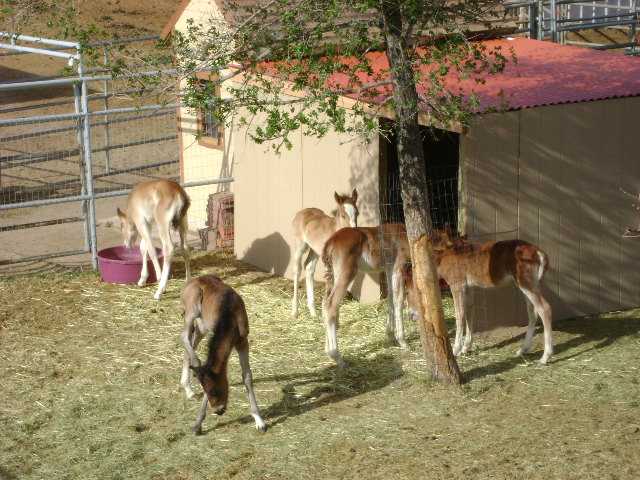Winter in Northern Nevada didn't seem to want to leave this year. Temperatures were swinging from mild and sometimes warm days to below freezing at night with driving winds and occasional light sleet or snow. Since the strategy was to keep the foals outdoors as much as possible, Shirley ordered new foal blankets to help the foals retain their body heat at night. All the foals except Austin took to their blankets. Austin would have nothing to do with them.
Getting comfortable wearing blankets.

Bruce and Mike decided to dismantle the old foal shelter and built what the volunteers dubbed the "Taj Mahorse" in the foal pen.
Starting construction.

While construction was underway BLM called and asked if we would consider bringing in another foal. This one, a filly about a week old, had a dam that was producing milk but the foal wasn't nursing well and was not putting on weight. We went and picked up the foal, and "Ellie" was added to the group just as Bruce and Mike were finishing up the new shelter.
Ellie getting used to her blanket.

Iron Man immediately bonded with Ellie, showing her about the foal pen, the water, hay, supplements and eventually the mare's milk replacer. Ellie immediately fell into step and integrated into the group, demonstrating approproate social characteristics and a healty appetite.
Following "Iron Man" about.

The foals were curious about the new shelter and for the most part they all slept all night inside it. However at first light they were eager to go back out, eat, explore and enjoy the morning sun.
Enjoying the sun after a night in the Taj Mahorse.

Social adjustment is a critical issue for horses that are not going to be turned out or returned onto open ranges. Social adjustment is influenced by proper handling at BLM facilities, the attitude of facility personnel, realistic expectations on the part of adopters and adopters who have the necessary basic skill set. When that continuity can be preserved, horses removed from public ranges can make a successful transition into private hands and flourish in such environments.
While we may argue over established range management policies and priorities, we cannot overlook the importance of safe, sane and humane assimilation of permanently removed horses into the domestic scene.
This feature will be continued as the foals progress. These foals will be available for adoption to qualified parties when they are old enough and healthy enough to be placed.
To learn about adopting one of these foals, please contact Shirley Allen, LRTC Adoption Program Manager at
shirley@whmentors.org or call 775-246-7636.
To learn about adopting one of the four foals received by Wild Horse Organized Assistance, please contact Dawn Lappin at 775-851-4817.
For adoption applications and to get information on other horses available for adoption please contact BLM's Palomino Valley Center at 775-475-2222.
|





